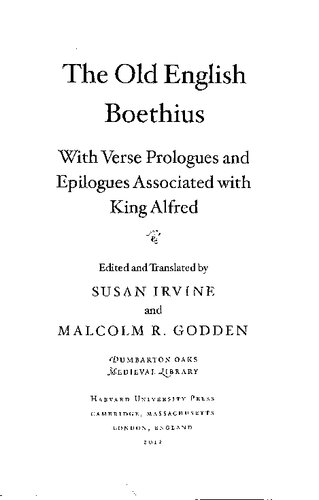

Most ebook files are in PDF format, so you can easily read them using various software such as Foxit Reader or directly on the Google Chrome browser.
Some ebook files are released by publishers in other formats such as .awz, .mobi, .epub, .fb2, etc. You may need to install specific software to read these formats on mobile/PC, such as Calibre.
Please read the tutorial at this link: https://ebookbell.com/faq
We offer FREE conversion to the popular formats you request; however, this may take some time. Therefore, right after payment, please email us, and we will try to provide the service as quickly as possible.
For some exceptional file formats or broken links (if any), please refrain from opening any disputes. Instead, email us first, and we will try to assist within a maximum of 6 hours.
EbookBell Team

4.7
96 reviewsThe Old English Boethius boldly refashions in Anglo-Saxon guise a great literary monument of the late-antique world, The Consolation of Philosophy. Condemned to death for treason around 525 ce, the Roman scholar Boethius turned to philosophy to transform his personal distress into a powerful meditation on fate, free will, and the human capacity for virtue in a flawed, fallen world. Boethius's Latin dialogues found a receptive audience in Anglo-Saxon England, where they were translated into Old English some time around 900. The translator (traditionally identified with King Alfred) freely adapts the Latin for a new audience: the Roman Fabricius, for example, becomes the Germanic weapon-smith Weland. The translation replicates Boethius’s alternation of prose and verse―only in this case Old English prose alternates with alliterative verse.
In later centuries Chaucer and Queen Elizabeth each turned The Consolation of Philosophy into English, but the Old English translation was the first to bring it to a wider vernacular audience. Verse prologues and epilogues for works traditionally associated with King Alfred fill out the volume, offering readers a fascinating glimpse of the moment when English confidently claimed its birthright as a literature capable of anything, from sublime ideas to subtle poetry.